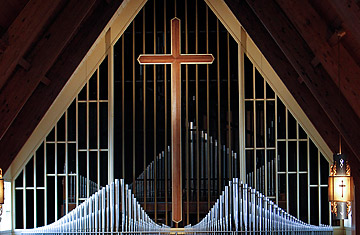
An imposition of ashes and the Holy Eucharist service was held at St. Martin's-In-The-Fields Episcopal Church at noon, Wednesday, February 22, 2012, in Columbia, South Carolina. Members came forward for the Rector to bless them and put ashes on their forehead in the shape of a cross.
Two years ago, the bishop of the Episcopal diocese of Texas, Andrew Doyle, was troubled. His chief worry: that the Episcopal Church's war over homosexuality was fated to distract the faithful from the missions of preaching the Gospel and helping the poor. So Doyle turned to someone who knew more than a little about how to deal with the apparently intractable: former Secretary of State James Baker, an Episcopalian and communicant, with Barbara and George H.W. Bush, of St. Martin's Church in Houston.
In a conversation at the James A. Baker III Institute for Public Policy at Rice University, Doyle and Baker agreed to think out possible diplomatic solutions to the crisis. The stakes were enormous: at a time of declining membership, seceding parishes and battles over property and endowments, the schismatic skirmishes over sexuality threatened to destroy the church. "In my experience, some issues can be so vigorously contested that resolution of them is unreachable," Baker later observed. Thus "the most practical approach usually is to address those matters where progress is possible, postpone decisions on irresolvable issues and mutually respect the differing opinions of each side."
The Baker-Doyle proposal: rather than impose an absolute edict on all churches and all clergy, Doyle's diocese would allow each priest, in conversation with his parish, to decide whether to bless gay unions. The conciliatory spirit of the project, which was in circulation before the church's General Convention met in mid-July, informed the national conversation. Around the country, bishops can set the pace at which individual churches move on the issue. The decision to allow differing levels of local control fits well within a religious tradition forged amid political and theological conflict over the nature of power in the 16th century.
Anglicanism has always been about the attempt--sometimes successful, sometimes less so--to find a via media, or middle way, between the stricter sacramentalism of Roman Catholicism and the stricter scriptural literalism of other Protestant denominations. The faith is driven in large measure by the same principle Walter Bagehot, an early editor of the Economist, identified as essential to the British constitution: the enduring effort to muddle through.
The question of the hour is whether the Episcopal Church can continue to muddle into a sixth century or whether falling membership suggests inevitable decline. Since 1970, amid debates over liturgy, the ordination of women and the place of homosexuals in the life of the church, the rolls have decreased from 3.3 million members to an estimated 1.9 million, according to the National Council of Churches.
Conservatives argue that the church is essentially translating liberal views of sexuality into the language and forms of the faith. If the Bible speaks out against homosexuality, this line of thinking goes, then a church that moves to embrace homosexuals is not acting according to theological thinking but is instead conforming to liberal chic.
